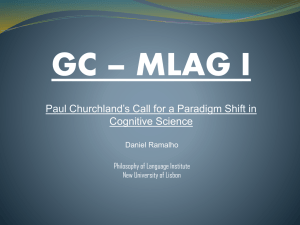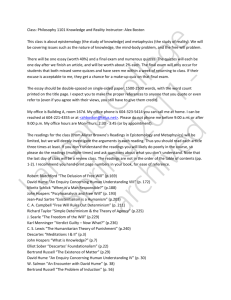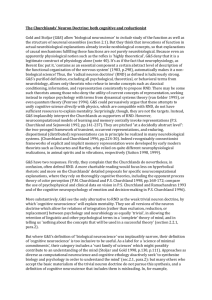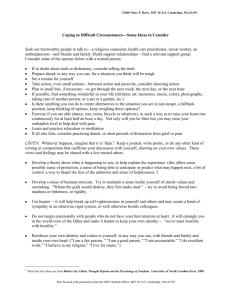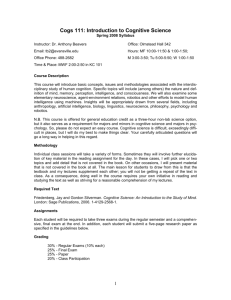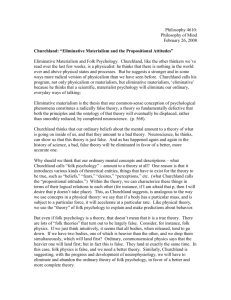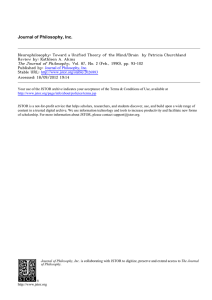Intro to Cognitive Science - Fall 2006 Syllabus
advertisement
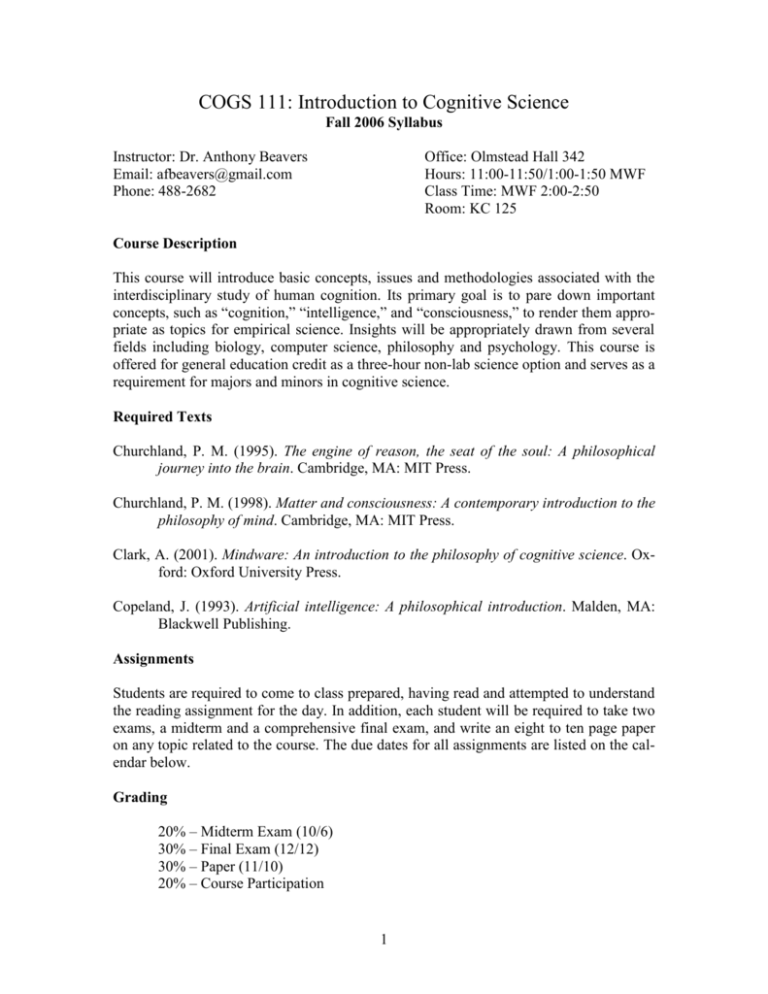
COGS 111: Introduction to Cognitive Science Fall 2006 Syllabus Instructor: Dr. Anthony Beavers Email: afbeavers@gmail.com Phone: 488-2682 Office: Olmstead Hall 342 Hours: 11:00-11:50/1:00-1:50 MWF Class Time: MWF 2:00-2:50 Room: KC 125 Course Description This course will introduce basic concepts, issues and methodologies associated with the interdisciplinary study of human cognition. Its primary goal is to pare down important concepts, such as “cognition,” “intelligence,” and “consciousness,” to render them appropriate as topics for empirical science. Insights will be appropriately drawn from several fields including biology, computer science, philosophy and psychology. This course is offered for general education credit as a three-hour non-lab science option and serves as a requirement for majors and minors in cognitive science. Required Texts Churchland, P. M. (1995). The engine of reason, the seat of the soul: A philosophical journey into the brain. Cambridge, MA: MIT Press. Churchland, P. M. (1998). Matter and consciousness: A contemporary introduction to the philosophy of mind. Cambridge, MA: MIT Press. Clark, A. (2001). Mindware: An introduction to the philosophy of cognitive science. Oxford: Oxford University Press. Copeland, J. (1993). Artificial intelligence: A philosophical introduction. Malden, MA: Blackwell Publishing. Assignments Students are required to come to class prepared, having read and attempted to understand the reading assignment for the day. In addition, each student will be required to take two exams, a midterm and a comprehensive final exam, and write an eight to ten page paper on any topic related to the course. The due dates for all assignments are listed on the calendar below. Grading 20% – Midterm Exam (10/6) 30% – Final Exam (12/12) 30% – Paper (11/10) 20% – Course Participation 1 Course Participation Course participation grades are not automatic. They are based on oral contributions to the collective learning experience of the class as a whole in terms of asking pertinent questions, answering questions correctly or, at least, provocatively, making insightful observations, and offering other meaningful expressions of interest in the material that help encourage learning. I begin by assuming a C for each student’s course participation grade and move from there. Students should realize that it is possible to talk a lot in class and receive a low grade for course participation. Frequent absences are also grounds for a low participation grade. Exam Format Both the midterm and final exams will involve a mixture of objective and written essay components. The objective part may consist of true/false and multiple choice questions with some additional items for matching. The written components will require short, paragraph-length answers. Students will be allotted fifty minutes for the midterm and two hours for the final exam. Paper Guidelines All papers should be typed, double-spaced in Times New Roman 12-point font with one inch margins on all sides. Each paper should include a title. They should be longer than eight pages and no longer than ten. Use at least four sources other than course books. Internet resources are not allowed, though you can use resources you find through online indices. The paper must be formatted in the APA style, 5th edition. Style manuals are available in the bookstore and library. Staple papers in the top, left corner. The paper can be on any topic related to the course, but make sure you are specific. Topics like “artificial intelligence” or “neurophysiology” are too broad. Topics such as “Artificial Vision in Computer-Animated Robots” and “Recent Attempts to Explain How the Brain Makes Memories” may not be, depending on how you focus your paper. If you are concerned about your topic, please feel free to stop by my office during office hours to discuss it. The paper is due in class on November 10th. If you would like to submit a preview copy for my comments prior to submitting the actual paper, you may do so, but only on or before October 27th. The final copy of your paper must be submitted to me in print and electronically by way of Turnitin.com. Attendance Because being present and attentive in class is part of (and perhaps the most important part of) the learning experience and because a serious comportment toward learning new ideas is necessary for understanding cognitive science, I have a serious attendance policy: final grades will be dropped a part letter grade for each unexcused absence after the 2 first. In order for an absence to be excused, students must submit an official university excuse in writing. I will NOT accept email for this purpose. Special consideration will be given to seniors who miss class for job and graduate school interviews that must be scheduled during class time. Incompletes Incompletes will be given only in rare circumstances and only when a previous arrangement has been made. Academic Honesty All work submitted in this course must be prepared by the student expressly for this course. A student who submits work that is plagiarized, bought, borrowed from the archives of a fraternity, copied from another student, etc., will fail the course. I fully support the University's Academic Honor Code. To avoid confusion, students should keep in mind that plagiarism occurs not only when someone copies an author word for word, but also when someone uses another's ideas without giving credit, even if the ideas are paraphrased (that is, put in your own words). Always document your sources! Optional Crick Lectures The University of Evansville’s Programs in Cognitive Science and Psychobiology jointly sponsor an annual lecture series on topics of mutual interest to the two programs. This semester’s “Crick Lectures in the Cognitive and Neural Sciences” are scheduled for September 13th and November 15th, 4:00-:500 p.m. in KC 101. Specific topics will be announced in class. Attendance is not required, but you might want to attend to enrich your own understanding of cognitive science. Supplemental Bibliography The following texts address some of the topics covered by the course. They range in difficulty from the easily-comprehensible to the exceedingly-tough. While I disagree with some of them, all are worth reading. Several were used in the preparation of this course. Beavers, A. F. (2002). Phenomenology and artificial intelligence. In J. H. Moor and T. W. Bynum (Eds.), Cyberphilosophy: The intersection of computing and philosophy (66-77). Malden, MA: Blackwell Publishing. Bennett, M. R. & Hacker, P. M. S. (2003). Philosophical foundations of neuroscience. Malden, MA: Blackwell Publishing. Calvin, W. H. (1996). How brains think: Evolving intelligence, then and now. NY: Basic Books. 3 Churchland, P. S. (1986). Neurophilosophy: Toward a unified science of the mind/brain. Cambridge, MA: MIT Press. Churchland, P. M. (1989). A neurocomputational perspective: The nature of mind and the structure of science. Cambridge, MA: MIT Press. Clark, A. (1993). Associative engines: Connectionism, concepts and representational change. Cambridge, MA: MIT Press. Clark, A. (1997). Being there: Putting brain, body, and world together again. Cambridge, MA: MIT Press. Clark, A. (2003). Natural-Born cyborgs: Minds, technologies, and the future of human intelligence. Oxford: Oxford University Press. Damasio, A. R. (1994). Descartes’ error: Emotion, reason and the human brain. NY: Harper Collins. Dennett, D. C. (1987). The intentional stance. Cambridge, MA: MIT Press. Dreyfus, Hubert L. (1992). What computers still can’t do: A critique of artificial reason. Cambridge, MA: MIT Press. Haugeland, J. (1985). Artificial intelligence: The very idea. Cambridge, MA: MIT Press. Haugeland, J. (Ed..). (1997). Mind design II: Philosophy, psychology, artificial intelligence. Cambridge, MA: MIT Press. Norman, D. A. (1993). Things that make us smart: Defending human attributes in the age of the machine. Cambridge, MA: Perseus Books. Pinker, S. (1997). How the mind works. NY: W. W. Norton and Company. Other Courses at UE The University of Evansville offers a wide range of courses that address themes raised in this introductory course. They include everything from detailed, low-level study of our neurophysiology and the philosophy of mind to how-to courses on writing artificial intelligence software and building robots. A majors and minor in cognitive science is also available. For information, visit http://cogsci.evansville.edu or see the university catalogue. Calendar of Assignments 8/23 – Course Introduction 4 8/25 – Churchland, M&C, 1-22: Substance and Property Dualism 8/28 – Churchland, M&C, 23-35: Behaviorism and Identity Theory 8/30 – Churchland, M&C, 36-49: Functionalism and Eliminative Materialism 9/1 – No Reading Assignment 9/4 – Clark, 1-27: Functionalism (again) and “Meat Machines” 9/6 – Copeland, 1-32: Artificial Intelligence? 9/8 – Copeland, 33-57: What is Intelligence Anyway? The Turing Test 9/11 – Copeland, 58-79: Computation 9/13 – Copeland, 79-82: Symbol Systems and Turing Machines / Optional Crick Lecture 9/15 – Copeland, 83-95: Knowledge Problems, The Frame Problem and Micro-Worlds 9/18 – Copeland, 95-120: Common Sense, Know-How and the Cyc Project 9/20 – Copeland, 121-139: The Chinese Room, Syntax and Semantics 9/22 – Copeland, 140-162: Freedom 9/25 – No Reading Assignment 9/27 – Churchland, M&C, 51-66: Folk Psychology and Propositional Attitudes 9/29 – Clark, 43-53: Realism, Eliminativism and Instrumentalism 10/2 – Clark, 53-61: Causes, Reasons and True Believers 10/4 – No Reading Assignment / Midterm Review 10/6 – Midterm Exam 10/9 – Fall Break 10/11 – No Reading Assignment 10/13 – Churchland, M&C, 67-81: Other Minds? My Mind? 10/16 – Churchland, M&C, 83-98: Finally, The Problem of Method 5 10/18 – No Reading Assignment 10/20 – Churchland, EofR, 1-19: Some Very Basic Neuroscience 10/23 – Churchland, EofR, 21-34: Sensory Representation and Vector Coding 10/25 – Churchland, EofR, 35-55: Facial Recognition 10/27 – Churchland, EofR, 57-96: Artificial Neural Networks, Stereoscopic Vision, Etc. 10/30 – Churchland, EofR, 97-121: Recurrent Networks 11/1 – Churchland, EofR, 123-150: The Neural Representation of the Social World 11/3 – Churchland, EofR, 151-183: Cognitive Dysfunction and Mental Illness 11/6 – Churchland, EofR, 187-226: Consciousness 11/8 – Churchland, EofR, 253-298: Language and Other “Human” Concerns 11/10 – No Reading Assignment / Paper Due 11/13 – Clark, 62-83: Neural Networks (Again), Mental Causation and Biological Reality 11/15 – Clark, 84-102: Perception, Action and the Brain / Optional Crick Lecture 11/17 – Clark, 103-119: Artificial Life Models and Emergence 11/20 – Clark, 120-139: Dynamic Systems / Cognitive Machines 11/22 – Thanksgiving Break 11/24 – Thanksgiving Break 11/27 – Clark, 140-159: Cognitive Technology and Situated Cognition 11/29 – Clark, 160-161: Clark Summary 12/1 – No Reading Assignment 12/4 – No Reading Assignment / Final Review 12/12 – Comprehensive Final Exam, 2:45-4:45 p.m., KC 125 6
